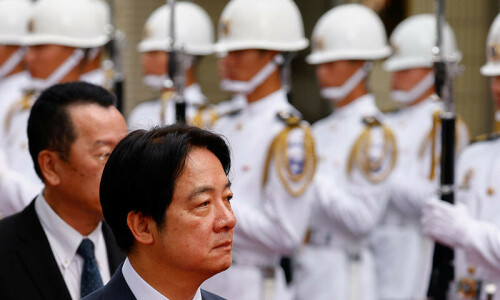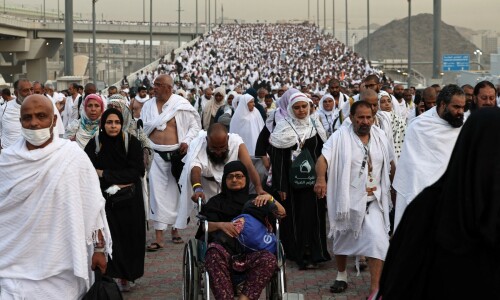ISLAMABAD, Jan 28: The Supreme Court made it clear on Friday that it would continue to supervise the cases of missing persons even if the government constituted a high-powered tribunal to take action on the recommendations put forward by a commission on the disappeared people.
A four-judge bench comprising Justice Javed Iqbal, Justice Raja Fayyaz Ahmed, Justice Anwar Zaheer Jamali and Justice Asif Saeed Khosa had taken up a number of cases relating to missing persons.
The court expressed concern over the growing number of complaints about the detention of citizens by intelligence agencies, but said it was more interested in the recovery of missing people than in registration of cases.
“The number of complaints regarding missing persons is increasing by the day,” Justice Javed said, adding that he received two more applications on Thursday. Interior Secretary Qamaruzzaman, who appeared before the court along with Defence Secretary Athar Ali, again requested the court to order the setting up of a tribunal, saying time of the court was too precious. He said the government was also working in the interest of the country.
Mr Qamaruzzaman cited the example of journalist Shakeel Turabi who had moved an application before the Supreme Court about the disappearance of his son Sharjeel Turabi. But when the whereabouts of Sharjeel were found and his meeting with his parents was arranged in the tribal areas, he refused to return home, despite requests by his mother. Justice Javed recalled a recent case of 11 missing prisoners who had disappeared from Rawalpindi’s Adiyala jail but who were found after extreme action was taken by the court. In some cases, he said, evidence showed that police had handed over people to intelligence agencies.
About the government’s willingness to legislate on the issue of holding spy agencies responsible for forced disappearances, Justice Javed observed that the court had to perform its duties in accordance with the available legislation. “It has no business asking the government to bring a new legislation because this is the job of parliament,” he said.
Justice Khosa said that constitution of the commission was a prerogative of the government and as such any initiative had to come from it. He added that the government did not need to tell the court or to seek its approval for setting up the tribunal. “If the government is convinced that this is the only method (of tracing missing persons) then go ahead with it,” Justice Khosa said, adding that judicial activism in such matters did not mean deactivation of other forums.
Deputy Attorney General K.K. Agha said the commission, set up on the orders of the Supreme Court, had divided the cases of missing persons into three classes after a thorough inquiry.
Nine chronic cases lingering on for the past seven to nine years should be settled through a sub-committee. Similarly, he said, the commission had suggested that 10 cases in which credible evidence was available against spy agencies and a set of other cases in which evidence was available should be decided by the tribunal.
Defence of Human Rights chairperson Amina Masood Janjua, who has been campaigning for the release of detained persons, including her missing husband Masood Janjua, opposed the idea of a new tribunal and argued that everything should be done by the Supreme Court which was a strong platform.
Before adjourning the hearing for Feb 3, the court assured the relatives of missing persons that it would continue hearing without any interval during which chronic cases would be taken up.
The court decided to club the complaints because of alleged extra-judicial killings of innocent people in the Lal Masjid operation on July 3, 2007.
“We will dedicate a full day to Lal Masjid (issue),” Justice Javed assured a complainant.














































Dear visitor, the comments section is undergoing an overhaul and will return soon.